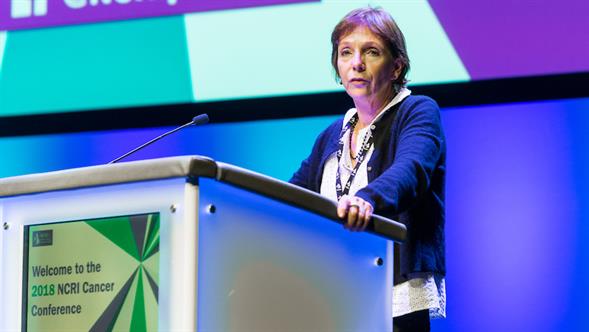
Scottish Event Campus. Venue of the 2018 NCRI conference. Photo credit: www.simoncallaghanphotography.com
This year was the first to see the National Cancer Research Institute (NCRI) move up to Glasgow and the delegates were welcomed into the beautiful conference building, aptly named the armadillo, to the sound of the bagpipes being played by a local musician sporting a kilt.
The event was kicked off by Nicola Sturgeon, First Minister of Scotland, who emphasised the importance of medical research in the wider vision for Scotland.
Over the last three days, a variety of delegates, dedicated to improving the lives of cancer patients and their families, joined together in hearing about the latest research that has been happening throughout the UK and beyond this past year.
Here are the main messages I took away from the conference:
We need to make it count for everyone
Among the huge variety of the talks at the conference, a central theme was the need for cutting-edge cancer research to benefit as many people as possible and to do its bit to address the sharp inequalities in health and life expectancy between different social groups.
Speakers discussed how to get the right information about cancer risk out there to people so that it is understood, remembered and acted upon, how to improve screening for cancer (and screening rates) and initiatives to reduce inequalities in treatment and survivor support throughout the UK.
Various researchers, such as Dr David Blane, an academic fellow in general practice at the University of Glasgow, and Professor Jo Waller from the University of London, highlighted how sharply a patient’s chances of surviving a cancer diagnosis depend on their postcode.
Evidence has shown that current methods just aren’t cutting the mustard at reaching everybody, and that to improve this a lot needs to be changed.
Information on cancer risk and treatment need to be communicated in a more targeted and direct way to ensure it is effective and that people are making informed decisions about getting screening, seeking help from the GP, and if diagnosed, choosing the correct treatment for them.
We also heard from Professor Dame Theresa Marteau DBE, from the University of Cambridge, about how best to go about changing people’s behaviours to try and reduce the risk of cancer. Her research again demonstrates the inequalities in health throughout the UK, and that our environment has a huge impact on whether or not we will change our unhealthy habits.
We also heard from her that improving information for people will only go so far, but to have the biggest impact we need changes in our environment and legislation from the Government.
To make a real improvement and reduce inequality, researchers, healthcare professionals, patients, and the Government all have a part to play in reducing the gap.
Catch up with all the latest ICR blog posts and video content from the 2018 National Cancer Research Institute (NCRI) conference 2018 in Glasgow.
Research can enhance the effectiveness of immunotherapy
Like last year, immunotherapy, a treatment that uses the body’s own immune system and turns it against cancer cells, was a large topic of debate throughout the conference.
One theme was how to apply our growing understanding of the subtleties of cancer immunology to refine and improve the effectiveness of current treatments.
There was a lot for example on how the mix of different types of immune cells within a tumour, the microenvironment around it, and even the bacteria and viruses that live within the human body all have an important effect on how patients respond to immunotherapies.
Researchers were able to talk about the fantastic advances these treatments are starting to deliver for a proportion of their patients, for example through use of a new class of drugs called checkpoint inhibitors.
These drugs block a natural signal that usually stops the immune system attacking the body’s own cells – but which is co-opted by cancer to hide from the immune system. By blocking the signal, checkpoint inhibitors unmask the cancer, leaving the immune system free to target it.
As we heard from Professor James Larkin, Consultant Medical Oncologist at The Royal Marsden NHS Foundation Trust and a Reader at the ICR, Dr Mary O’Brien from The Royal Marsden, and Dr Paul Nathan from Mount Vernon Hospital, checkpoint inhibitors, such as nivolumab, pembrolizumab, and ipilimumab have improved survival, sometimes miraculously, for many patients living with late-stage lung cancer and malignant melanoma.
These patients previously had very few treatments options, and often didn’t survive very long, living on very harsh chemotherapies.
All three stressed that we still need to know more about who immunotherapy works for and why, so we can treat patients more effectively and discover treatments which work for more people.
The side-effects of checkpoint inhibitors such as nivolumab are generally much less severe than traditional treatments like chemotherapy, but even so, living with them can be a burden. With immunotherapy being a relatively new treatment area, there are still gaps in our knowledge about how to best reduce and manage side-effects.
That’s especially the case for the new group of patients who in the past would have died from their disease but are now living much longer, in some cases with long-term adverse effects from their treatment.
A key theme was that the successes so far with immunotherapy are just the start, and that research will deliver more effective treatments, and improvements in their use that will enhance patients’ quality of life.
Living with and beyond cancer
The NCRI held true to its unique focus, including patients and patient representatives in every part of their conference. They launched their list of 10 top research priorities for living with and beyond cancer.
The initiative was more than 18 months in the making, and led by a Priority Setting Partnership and the James Lind Alliance. Two surveys were completed, which totalled the opinions of 3,500 people. Reflecting this, 3,500 high-priority questions from patients were boiled down to 10 key priorities.
We heard from two patient representatives highly involved in the project, Ceinwen Giles, Director of Partnerships and Evaluation at Shine, a young adult cancer support charity, and Richard Stephens, Chair of the NCRI Consumer Forum.
The top 10 research priorities for living with and beyond cancer are:
1. What psychological support package improves psychological wellbeing, social functioning and mental health during and after treatment?
2. What interventions, including self-care, can reduce or reverse adverse short and long-term effects of cancer treatment?
3. What are the best strategies to improve access to clinical trials?
4. What GP or young person strategies, such as awareness campaigns and education, improve early diagnosis for young people with suspected cancer?
5. What are the best ways of supporting a young person who has incurable cancer?
6. What are the most effective strategies to ensure that young people who are treated outside of a young person’s principal treatment centre receive appropriate practical and emotional support?
7. What interventions are most effective in supporting young people when returning to education or work?
8. How can parents/carers/siblings/partners be best supported following the death of a young person with cancer?
9. What is the best method of follow-up and timing which causes the least psychological harm, while ensuring relapse/complications are detected early?
10. What targeted treatments are effective and have fewer short and long-term side-effects?
As a cancer survivor myself, it was an exciting moment to see the importance of improving quality of life for people living with cancer or beyond cancer given the direction and attention it needs. Currently, 2.5 million people in the UK are living either with or beyond cancer, and thanks to advances in cancer research and treatment we expect this to rise to 4 million people by 2030.
At the ICR one of the pillars of our research strategy is to ensure we make our discoveries count for patients, by embedded them in routine management and care. That includes helping to ensure smarter, kinder treatments are developed and adopted, so that not only do more people live with or beyond cancer, but also that they can do so happily and healthily.
The audience heard from the panel about how they plan to ensure these priorities are considered throughout cancer research to get the benefits to patients and survivors, including securing funding for further research, influencing groups and spreading the message far and wide.
The conference session was a good start.
Ready for NCRI 2019

Professor Clare Isacke giving the closing address. Photo credit: www.simoncallaghanphotography.com
The conference was wrapped up by the ICR’s Dean Professor Clare Isacke, who next year will be co-chairing the NCRI. Professor Isacke thanked everyone who was involved in making NCRI 2018 a success and expressed her excitement for next year. You can find out more about what Professor Isacke is looking forward to in 2019 by watching this video.
See more ICR content from NCRI 2018 conference:
- Video: Professor Clare Isacke talks about NCRI 2019
- Blog: Three new ways researchers are combatting cancer
- Video: Professor Clare Isacke on single-cell technologies
- Blog: Using liquid biopsies to understand cancer treatment
- Video: Dr Iain Frame on exciting cancer research in 2019
- Blog: World leading cancer researchers and clinicians gather in Glasgow
